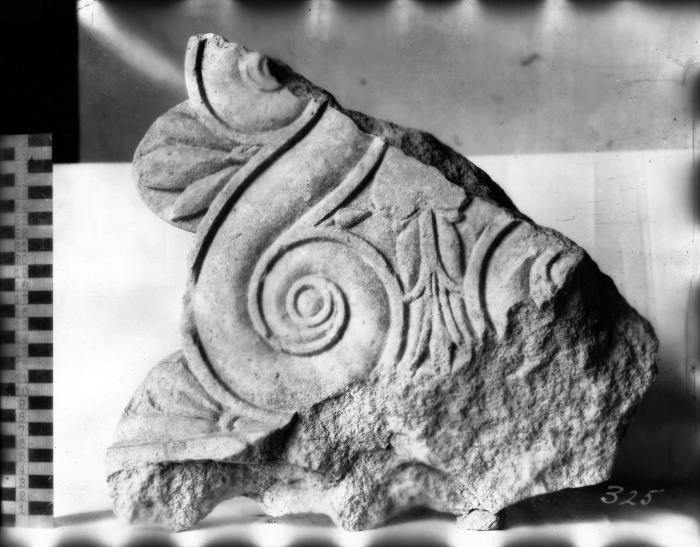Fragment of Anthemion
- Date
- 500-450 BC, Late Lydian (Persian)
- Sardis or Museum Inv. No.
- Uninv. R2, Cat. 48
- Material
- Marble, Stone
- Object Type
- Sculpture
- Sculpture Type
- Stele
- Site
- Sardis
- Findspot
- Exact findspot unknown; from first Sardis expedition excavations.
- Description
The finial consisted of two spirals symmetrically placed in lyre-like design. H.C. Butler writes, "The two double reversed scrolls carried some crowning feature like a palmette. The scrolls were described by pulvinated bands with raised flat edges. The larger were filled by triple leaves (palmettes) of convex surface, the smaller ones by slender buds." The spirals are slightly convex in section between bands. A horizontal half-palmette lies at the lower, outer I. volute. The volute eyes are rather large, undecorated, convex disks. The central feature is a two- storied, downward-pointed lotus with five leaves.
The fragment is known only from a photograph published by Butler (Sardis II, ill. 93, here Fig. 155). The formation and proportions of the volutes with large, simple eye begin to recall lonic capitals of ca. 500 B.C. (cf. Hanfmann, Rayonnement, 494, pl. 123:3). The elaborate formation of the central lotus is also of the 5th C. B.C., a time when the lyre-design was popular on terracottas (cf. Åkerstrom, Terrakotten Kleinasiens, 93). In conservative Sardis, such a design might occur even in the mid-5th C. B.C.
- Condition
Marble.
Fragment of anthemion consisting of two "lyre-design" volutes. Broken diagonally across from mid-eye of l. volute to top of lower spiral of r. volute, and across lower face.
- Dimensions
- P.H., scaled from Butler's photo, ca. 0.35.
- Comments
- Now lost.
- See Also
- Bibliography
- Published: Sardis II, 80, ill. 93; Buschor, Grabstelen, 28; Borchhardt, Epichorische Reliefs, 175; Hanfmann, Stelai, 42, 44, fig. 5 (H-44).
- Author
- GMAH

